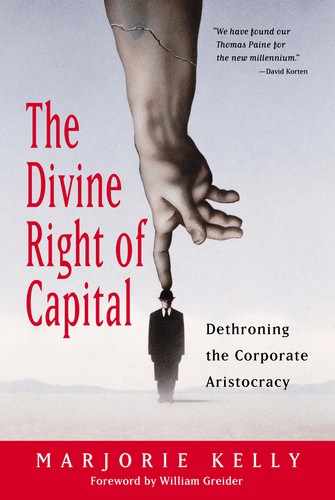0%
35Chapters
0-1Hours read
0kTotal Words
Book Description
Wealth inequality, corporate welfare, and industrial pollution are symptoms-the fevers and chills of the economy. The underlying illness, says Business Ethics magazine founder Marjorie Kelly, is shareholder primacy: the corporate drive to make profits for shareholders, no matter who pays the cost.In The Divine Right of Capital, Kelly argues that focusing on the interests of stockholders to the exclusion of everyone else's interests is a form of discrimination based on property or wealth. She shows how this bias is held by our institutional structures, much as they once held biases against blacks and women.
The Divine Right of Capital exposes six aristocratic principles that corporations are built on, principles that we would never accept in our modern democratic society but which we accept unquestioningly in our economy. Wealth bias is a holdover from our pre-democratic past. It has enabled shareholders to become a kind of economic aristocracy. Kelly shows how to design more equitable alternatives-new property rights, new forms of corporate governance, new ways of looking at corporate performance-that build on both free-market and democratic principles.
We think of shareholder primacy as the natural law of the free market, much as our forebears thought of monarchy as the most natural form of government. But in The Divine Right of Capital, Kelly brilliantly demonstrates that it is no more "natural" than any other human creation. People designed this system and people can change it.
We need a change of mind as profound as that of the American Revolution. We must question the legitimacy of a system that gives the wealthy few-the ten percent of Americans who own ninety percent of all stock-a disproportionate power over the many. In so doing, we can fulfill the democratic principles of our nation not only in the political sphere, but in the economic sphere as well.
Table of Contents
- Cover Page
- Title Page
- Copyright Page
- Dedication Page
- Contents
- Foreword
- Preface
- Acknowledgments
- Introduction
- Part I Economic Aristocracy
- Part II Economic Democracy
- Conclusion: Enron’s Legacy: An Opening for Change
- Reader’s Guide to Action
- Notes
- Index
- About the Author
